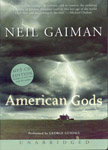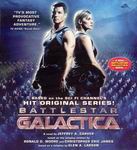
 The Shadow Killer
The Shadow Killer
By Matthew Scott Hansen; Read by William Dufris
2 MP3 CDs or 12 CDs; Approx. 15 hrs – [UNABRIDGED]
Publisher: Tantor Audio
Published: 2007
ISBN: 1400153255 (MP3-CDs); 9781400103256 (CDs)
Themes: / Horror / Sasquatch / Paranormal / Indigene / Monster / Mystery / Mythical Creature /
At first I thought to myself. Bigfoot? Really? It just seemed like the sort of thing you might find in the B-movie isle at Blockbuster. In a way, yes, it is, but not in that cheap, cheesy sort of way, where you feel like you’re just a little dirtier, just a little dumber just for watching. No, The Shadow Killer by Matthew Scott Hansen is a novel that takes all the known clichés from this sort of monster/disaster stories and hones in on the razor sharp edges of them. He does this while still keeping the book compulsively fun.
You know how Bigfoot always seems like a really tall guy in a monkey suit? Well, this is not that kind of Bigfoot story. The luxury of Bigfoot in written form, is that Bigfoot can be as big as the author wants him to be. In fact, there is much of the book spent avoiding the specifics of the actual size, allowing the reader/listener to come up with their own idea of how big it is.
This sasquatch is an angry one. The beginning of the story tells of how his tribe, clan, family, kin have been wiped out and killed by a forest fire. He is the lone survivor and is set off on a mission of revenge towards “The Keepers of Fire”, who just turn out to be us humans. He starts wreaking havoc and slowly builds up to a terrorizing rampage. But, since the existence of Bigfoot has never been proven, it’s not exactly easy to catch him, or even figure out what exactly is going on.
This edge-of-your-seat thriller centers around an ensemble cast who each have varying degrees of faith in the actual existence of this giant. There is a retired software engineer, whose life has been in shambles since he actually encountered a different Bigfoot three years prior, while on vacation. No one believed him, of course, and he has been obsessed ever since. There’s a Sheriff’s Detective who gets assigned to the investigation of all the strange occurrences and missing people in the area. There is even a bloodthirsty TV reporter who has aspirations towards the big time, and she too latches on to the story, willing to do anything to get higher ratings. Last, there’s my favorite character; Ben, aging Indian, who has been having dreams about being chased by this enormous beast. He seems to be connected to this animal and begins searching for it, not knowing exactly what will happen when he finds it. The story seems like a bunch of people being eaten and terrorized for the first several chapters, until Ben is introduced. He’s instantly likeable.
The story is relentless. Once it gets going, it does not let up, and while a few of the characters of this book are still standing in the end, no one gets out with out a few battle wounds, both physically and emotionally. These people get run through the wringer and you go through the wringer with them. As the reader, you start to wonder how much more of this they can take. The writing and descriptions of these scenes are of laser intensity. You know within just a few words of meeting a character whether you are going to like that character or hate them, and once you do like or hate a character the rest of the tale only strengthens your feelings in that direction.
For me, the most enjoyable part of listening to this book was the narration by William Dufris. He is a master of capturing the emotion and feeling of a moment, and in such a way that it really plays out in your mind. Where some narrators might perform a little bit, putting some feeling in to the character’s dialogue and descriptions, Dufris turns his reading in to a tour de force.
This book has numerous characters, all with different voices and attitudes. He can make you laugh, cry, cringe and feel out of breath, all with a few simple inflections to his voice. Female characters somehow sound like real women, and there is not one ounce of discomfort or sense of overacting. Dufris does the reading so well, that you forget that you are actually listening to one man doing all of this by himself. All the while making it seem like it is the simplest of actions. Just like most masters of their craft, William Dufris makes his vocation, audiobook narration, look easy.
All in all, this audio book is a highly entertaining listen. Its got a little bit of everything. But, be warned this is adult material. There are verbose detailed sexual situations and gore that place very interesting pictures in your head. Including one scene of murder where the animal can sense that the woman he is killing is “ready to mate”. What follows after, is one of the few times I have ever felt queasy about what I was listening to. That scene is very well written and extremely vivid, but still discomforting. When you think it’s as bad as it is going to get for this woman, it gets even worse, and I’ll just leave it at that.
So, if you have a strong stomach, like a monster story with great characters and a great narrator, this audio book does what I feel audio books should do for the listener; it won’t let you stop listening to it. In the 15 hours I spent listening to this novel, I never felt bored and my sense of dread and fear for the characters was omnipresent. Maybe, by the time you finish listening, you’ll believe in Bigfoot too.
posted by Michael Bekemeyer of the Scatterpod podcast

 Audio Gothic is one of Crazy Dog Audio Theatre‘s odder ventures. It was broadcast on RTÉ (Radio Ireland) in 2006. One part of Audio Gothic is entitled Marsyas: The Hippest Satyr. Here’s the complete work (in the form of successive YouTube videos) as staged at the Dublin Fringe Festival in 1999. Here’s the description:
Audio Gothic is one of Crazy Dog Audio Theatre‘s odder ventures. It was broadcast on RTÉ (Radio Ireland) in 2006. One part of Audio Gothic is entitled Marsyas: The Hippest Satyr. Here’s the complete work (in the form of successive YouTube videos) as staged at the Dublin Fringe Festival in 1999. Here’s the description:






